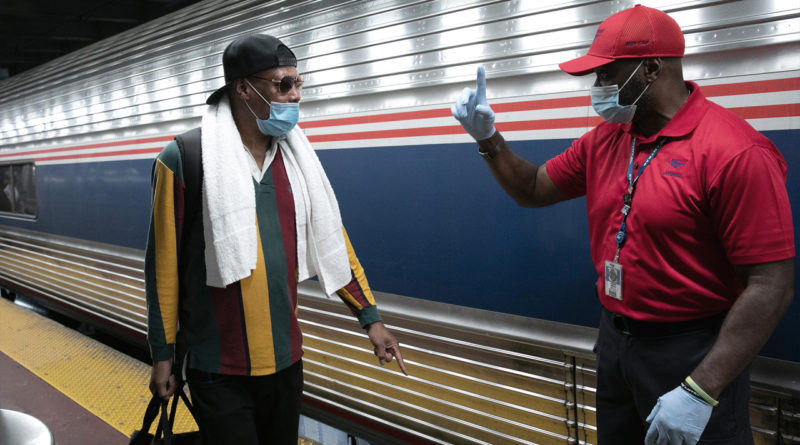NYC begins registering travelers at COVID-19 checkpoints
NEW YORK (AP) — New York City opened new traveler checkpoints Thursday to register visitors and residents returning from nearly three dozen states who are required to quarantine for 14 days — an initiative that drew swift criticism from privacy advocates.
The checkpoints, targeting busy entry points like Penn Station, are more of an awareness campaign than a blockade, intended to preserve the city’s progress reducing its COVID-19 infection rate and forestall a second wave as the coronavirus ravages other states.
Authorities said this week a fifth of all new coronavirus cases in New York City have been from travelers entering the city from other states.
The random checks are similar to an effort already in place at airports and includes offers of free food delivery and in some cases even hotel stays for people who must quarantine.
Teams began stopping travelers arriving in the city by train Thursday, requiring they complete a state Department of Health traveler form and warning they could face fines as high as $10,000 for failing to quarantine.
The checkpoints don’t involve the police, but the city’s Sheriff’s Office, which enforces civil law, said it would pull over motorists at random on city bridges.
“If we’re going to hold at this level of health and safety in this city and get better, we have to deal with the fact that the quarantine must be applied consistently to anyone who’s traveled,” Mayor Bill de Blasio said.
Despite the specter of fines, the checkpoints are more educational than punitive, and officials acknowledged the effort relies on voluntary compliance.
“We’re not going to be in everyone’s apartment monitoring them,” de Blasio said. “Even if we’re not going to be able to reach every single person with a checkpoint, I think it’s going to help really get the message across.”
The campaign was criticized for sowing confusion and raising questions about how travelers’ personal information would be retained.
It’s not clear how long the registration checkpoints will remain in place. De Blasio said the city will use the approach “for as long as we think makes sense and as extensively as we think makes sense.”
“Calling a law enforcement action a public health measure does not make it one,” said Donna Lieberman, executive director of the New York Civil Liberties Union. “We know that law enforcement should not have any role in contact tracing — it is ineffective and raises serious questions on inequitable enforcement and what information will be mandated.”
Sheriff Joseph Fucito said his teams would stop every sixth or eight car on bridges and follow “a uniform procedure that will be applied to all New Yorkers.”
“We’re looking at a full-fledged checkpoint where it is viable,” Fucito said, “and we’re also looking at individualized stops where we think it would be more suited to avoid having a traffic condition.”
Ted Long, executive director of Test and Trace Corps, said his team was working “as fast as humanly possible to set up” a support system for travelers required to quarantine, including helping them obtain medications and connect with their doctors by phone.
He said officials have made more than 86,000 phone calls and sent more than 20,000 text messages to travelers entering New York City from states with high coronavirus infection rates.
“If we can’t get through to you on the phone, we’ve deployed teams that are now knocking on your door to check in with you and to make sure that you’re safe,” Long said. “We know that it’s not easy to get through a two-week period of safe separation, but it’s incredibly important.”
LATEST NEWS FROM WFLA.COM:




